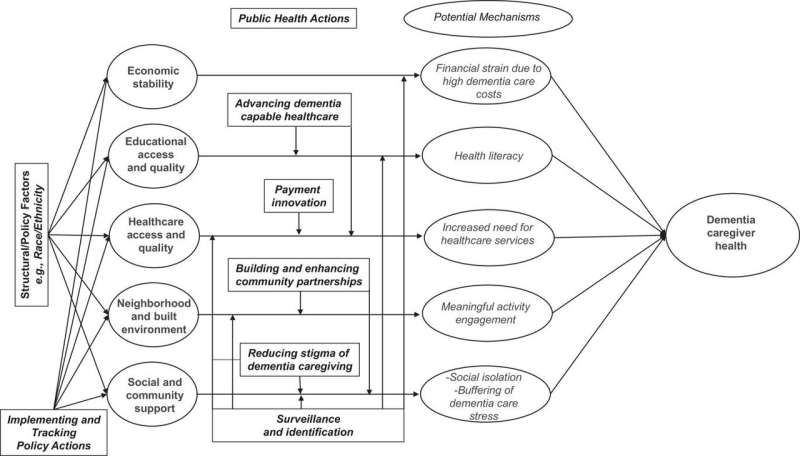Public health initiatives can support caregivers of people with Alzheimers and related dementia


Unlike many other long-term health conditions, most people with Alzheimer’s disease and related dementia (ADRD) receive some or all of their care from an unpaid relative or friend—a situation that has spawned robust scientific literature on the potentially negative health implications of caring for a friend or family member over a sustained period of time.
But while the health effects of ADRD caregiving have been thoroughly examined, the research literature on the relationship between broader social determinants of health and ADRD caregiving is less developed. Social determinants of health factor in a wide range of quality-of-life outcomes that are often grouped into five domains: economic stability; education access and quality; health care access and quality; neighborhood and built environment; and social and community context.
These SDOH also could have significant impacts on ADRD caregivers and should be explored from a population perspective.
In a new study published in Alzheimer’s & Dementia, SPH researchers aim to fill this gap. Through a review of the scientific literature, researchers highlight several public health actions that could address critical issues at the intersection of social determinants of health and ADRD caregiving, including:
- Improve identification of ADRD caregivers. Gaps in data are a major challenge in understanding the public health challenges of ADRD caregiving. Using surveys, information could be gathered to help support initiatives targeted to specific challenges of ADRD caregivers.
- Build and enhance community partnerships. Public health agencies should work to forge connections among ADRD caregivers through efforts like the national Dementia Friendly American networking program.
- Advance health care policies that support caregivers. Caregivers have important roles in our health care system, yet their roles are not articulated effectively within the policies of health care delivery systems. More effective public policies could formally identify the role and status of caregivers in the health care system. A payment system that recognizes and incentivizes the work of ADRD caregivers is also recommended.
- Reduce the stigma of ADRD caregiving. Reducing any stigma associated with ADRD caregivers could potentially help address feelings of social isolation and improve quality of care.
“Dementia caregiving significantly influences and is influenced by social determinants of health, yet we lack a solid understanding of the interplay between social determinants of health and ADRD caregiving,” says Joseph Gaugler, SPH professor, director of the Building our Largest Dementia Infrastructure (BOLD) Public Health Center of Excellence on Dementia Caregiving, and lead author of the study.
“By aligning ADRD caregiving within the social determinants of health framework, we are able to develop multiple public health strategies aimed at improving the overall health of ADRD caregivers. By engaging in one or all of these recommended actions, public health practitioners could help address the numerous challenges facing those ADRD caregivers at risk for emotional, social, financial, psychological, and health disruptions.”
More information:
Joseph E. Gaugler et al, The intersection of social determinants of health and family care of people living with Alzheimer’s disease and related dementias: A public health opportunity, Alzheimer’s & Dementia (2023). DOI: 10.1002/alz.13437
Journal information:
Alzheimer\’s & Dementia
Source: Read Full Article